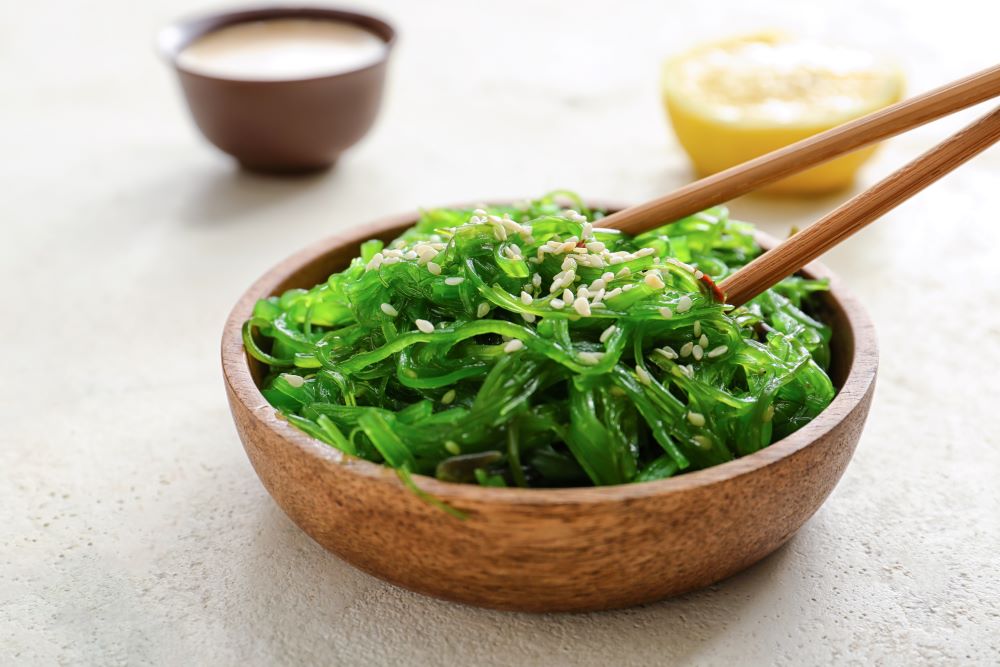Kelp: The Rich Source of Iodine You Need to Know About!

Kelp is a type of seaweed that has recently gained attention as a potential source of iodine. Iodine is an essential nutrient for our thyroid function. Our thyroid gland relies on iodine to produce hormones that regulate metabolism, growth, and development. Without sufficient iodine, our thyroid gland can become enlarged, leading to a variety of health problems.
In this brief post, we will review kelp as a source of iodine, discuss the importance of iodine for thyroid function, and explore how incorporating kelp into our diet and supplement routine can both boost our iodine intake and support our thyroid health.
Kelp, what is it?
Kelp is a type of brown seaweed that is found in shallow ocean waters around the world. Kelp is a rich source of a variety of nutrients, including iodine, vitamins, minerals, and antioxidants, making it a popular ingredient in many health supplements and foods.
One of the key nutrients found in kelp is iodine, which is essential for healthy thyroid function. Our thyroid gland relies on iodine to produce hormones that regulate metabolism, growth, and development. If we don’t have sufficient iodine, our thyroid gland can become enlarged, leading to a variety of health problems such as hypothyroidism, a condition in which our thyroid gland does not produce enough thyroid hormone.
The amount of iodine in kelp can vary depending on several factors, including the location where it was harvested, the species of kelp, and the processing method used. However, kelp is one of the richest sources of iodine in the world, with some species containing up to 2,000 times our daily recommended intake of iodine in just a single gram.
In addition to iodine, kelp is also rich in other nutrients that are important for our overall health. It contains vitamins A, C, E, and K, as well as B vitamins and minerals such as calcium, magnesium, and potassium. Kelp also contains a variety of antioxidants, including fucoxanthin, which has been shown to have anti-inflammatory and anti-cancer properties.
Iodine and thyroid function
The thyroid is a small butterfly-shaped gland in our neck that produces hormones that regulate metabolism and energy production in our body. Iodine is used by the thyroid gland to produce these hormones, and without adequate iodine intake, the thyroid gland cannot function properly.
When our body is deficient in iodine, we can be exposed to a variety of other health problems, including thyroid disorders. This can lead to a range of symptoms including fatigue, weight gain, cold intolerance, and depression. In addition to these health consequences, iodine deficiency can also have economic and social implications. It can affect our cognitive function and productivity and can be a significant burden on healthcare systems in areas where it is prevalent. The World Health Organization recommends a daily intake of 150 micrograms of iodine for adults, which can be achieved through a balanced diet that includes iodine-rich foods such as kelp, seafood, dairy products, iodised salt and supplementation.
Other health benefits of Kelp
In addition to being a rich source of iodine, kelp contains a variety of other beneficial compounds that may contribute to its health-promoting properties.
One of the key potential health benefits of kelp is its anti-inflammatory properties. Inflammation is a natural response of our immune system to injury or infection. Though chronic inflammation is thought to contribute to a variety of health problems, including heart disease, cancer, and arthritis. Kelp contains compounds known as fucoidans, which have been shown to have anti-inflammatory effects in animal and cell studies.
Kelp is also a rich source of antioxidants, compounds that help protect our body against damage from harmful molecules known as free radicals. Free radicals are produced because of normal metabolic processes and can damage cells and contribute to aging and disease. Kelp contains a variety of antioxidants, including vitamins C and E, and beta-carotene, which may help us protect against oxidative damage and reduce the risk of chronic diseases.
Kelp may also promote our heart health. Some studies have suggested that kelp may help reduce our levels of LDL cholesterol, or "bad" cholesterol, which is a major risk factor for heart disease. Other research has suggested that the compounds found in kelp may have blood-thinning properties, which could help us reduce the risk of blood clots.
Kelp may also have benefits for our gut health. Some studies have suggested that the fibre found in kelp may help support the growth of beneficial gut bacteria, which can contribute to our overall health and reduce the risk of disease. Additionally, some of the compounds found in Kelp may have prebiotic effects, which means they help promote the growth of beneficial gut bacteria.
Though more research is needed to fully understand the potential health benefits of kelp, this nutrient-rich food has a lot to offer us. From its anti-inflammatory and antioxidant properties to its potential benefits for heart and gut health, kelp is a food that should be included as part of a healthy, balanced diet.
To summarise
Kelp is rich in iodine, a vital nutrient for our thyroid function, metabolism, growth, and development. In addition to iodine, kelp is a rich source of vitamins, minerals, and antioxidants. Iodine deficiency can lead to thyroid disorders, fatigue, weight gain, cold intolerance, and depression. Kelp also has anti-inflammatory properties, promotes heart and gut health, and has potential anti-cancer properties. Ensuring an optimal intake through a balanced diet and supplementation can provide us with various health benefits and prevent potential health consequences of iodine deficiency.







